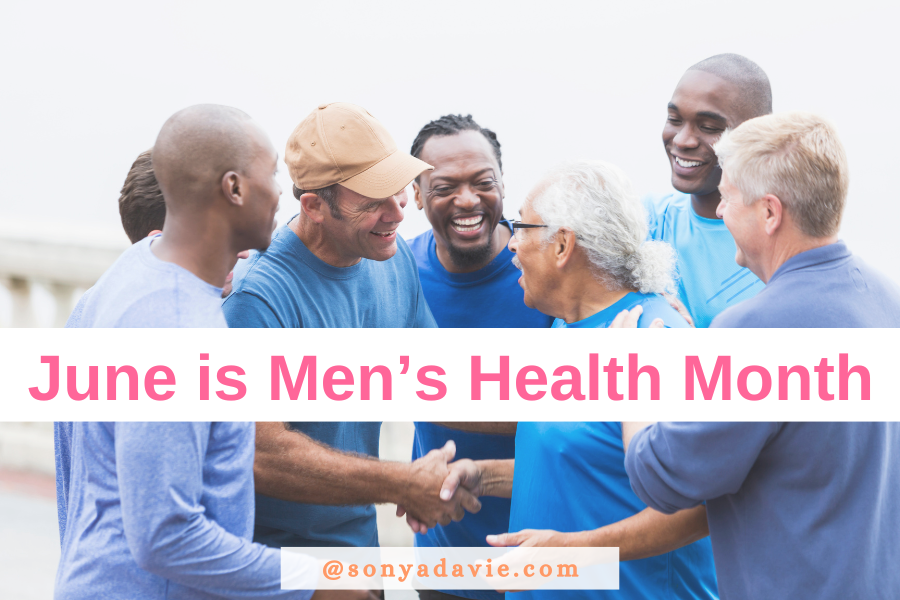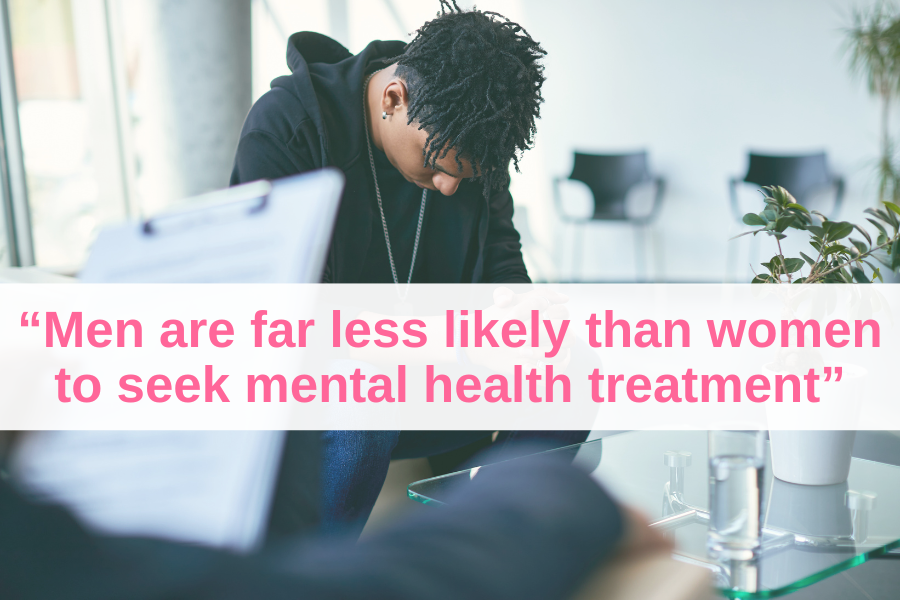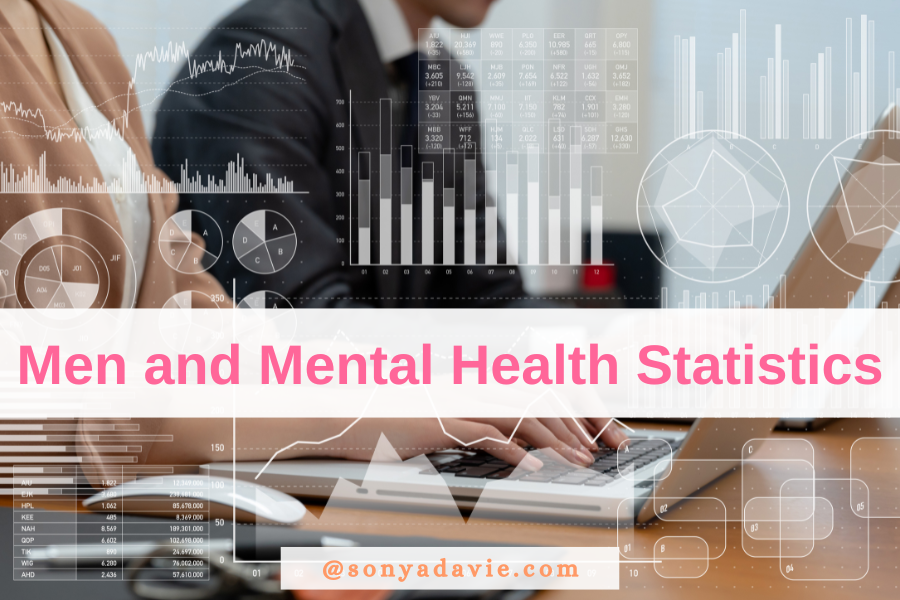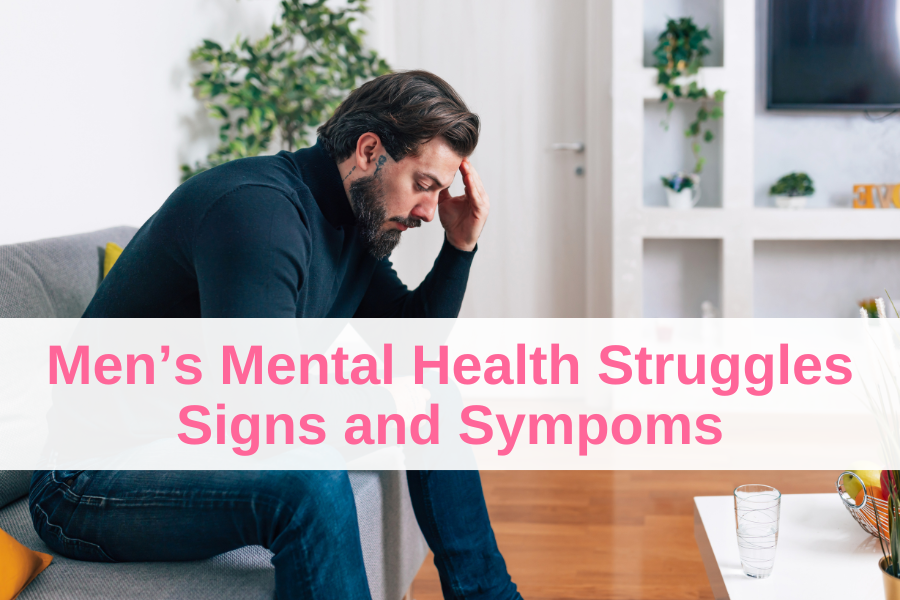June is Men’s Health Month! A time to highlight the importance of physical, emotional, and mental well-being for the men in our lives.

While fitness, nutrition, and annual checkups often take center stage, men’s mental health deserves just as much attention. Men face unique challenges in recognizing, expressing, and addressing mental health struggles.
And this post is here to shed light on men’s mental health, challenge outdated stigma, and provide resources that help men live fuller, healthier lives.
Men’s Mental Health: A Look at the Landscape
Mental illness doesn’t discriminate, but men often face specific cultural and societal barriers that prevent them from getting the support they need.
According to the National Institute of Mental Health (NIMH), men are far less likely than women to seek mental health treatment, despite experiencing mental health struggles at comparable rates. (NIMH)

This isn’t because men suffer less; it’s because they’re more likely to hide it.
Why the Gap?
🔹 Stigma Around Vulnerability
Cultural messages often tell men they must be tough, independent, and unemotional. Admitting to feeling anxious, hopeless, or overwhelmed can be perceived as weakness, even though it takes great strength to face these challenges.
🔹 Limited Emotional Awareness
Many men struggle to identify symptoms of depression or anxiety. Emotional pain may be labeled as “stress” or “just life,” delaying professional care.
🔹 Lack of Open Support Systems
While women may have emotionally supportive relationships, male friendships are often activity-based. That can leave less room for honest conversations about mental well-being.
The Suicide Crisis: What the Numbers Reveal
The most heartbreaking consequence of untreated mental illness? Suicide.
📊 According to the Centers for Disease Control and Prevention (CDC), men in the United States die by suicide at a rate four times higher than women. It’s one of the leading causes of death among men, especially those in middle age. (CDC 2023 Data)
What makes this even more alarming is that men are less frequently diagnosed with depression, yet their suicide rates are significantly higher.

The emotional burden of untreated mental health conditions—paired with societal pressure to “tough it out” and stay silent—is fueling a growing crisis we can’t afford to ignore.
What About the Pandemic’s Impact?
COVID-19 made things worse. Research shows rising levels of depression, anxiety, and suicidal ideation among men, especially those isolated from social and emotional support.
How Men Experience Mental Health Differently
Mental illness doesn’t always look the same in men. It can show up in ways that don’t fit the typical image of depression or anxiety. Here are a few ways men may experience or express mental health challenges!

Signs and Symptoms in Men:
- Escapism: Working long hours, compulsive gaming, or intense focus on physical activity can serve as distractions from deeper emotional distress.
- Physical Ailments: Depression may show up as chronic headaches, digestive issues, or unexplained pain.
- Substance Misuse: Many men turn to alcohol or drugs to cope. This only deepens mental health challenges and can lead to addiction.
- Mood Changes: Irritability, anger, or emotional numbness may replace sadness or worry.
- Energy Swings: Fatigue and restlessness can alternate, making daily functioning difficult.
- Appetite and Weight Shifts: Overeating or loss of appetite due to unmanaged stress is common.
- Suicidal Thoughts: Expressions of hopelessness, feeling like a burden, or giving away possessions should never be ignored.
Report says: More than 6 million men in the U.S. experience depression each year, but many go undiagnosed. (Mental Health America)
The Importance of Prioritizing Men’s Mental Health
Men’s mental health isn’t just a personal issue, it’s a public health issue.
When men are emotionally well:
- They’re more present in their relationships
- They model emotional intelligence for future generations
- They’re less likely to suffer in silence or turn to harmful coping mechanisms
Let’s shift the conversation so men feel safe to seek help, express their feelings, and explore their inner lives without shame.
📚 Tools to Support Men’s Emotional Healing
This Men’s Health Month, consider sharing or gifting these powerful books by Pervis Taylor III—tools that help men take charge of their emotional wellness:

📘 Heal Forward: Four Steps to Purposeful Living
This guide walks men through the 4V Method—Vision, Verified, Voice, and Vulnerability—to move from trauma to thriving.
📘 Surthrival Mode
Taylor shares his own story of overcoming abuse and depression while teaching the 4A Method—Acknowledgment, Acceptance, Articulation, and Alchemy.
These resources provide actionable steps and relatable stories to help men build resilience, purpose, and self-awareness.
And for even more wellness gift ideas, I’ve curated a list of 90+ thoughtful items designed to support his mental, emotional, and physical well-being.
From stress-relieving tools and self-care kits to books, supplements, and fitness essentials, these gift ideas are perfect for celebrating the men in your life—whether it’s for Father’s Day, a birthday, or simply to say “you matter.”
Explore the full guide and find the perfect pick to inspire balance, healing, and self-care.
Let’s End the Silence!!!
June is the perfect time to talk about mental health and offer support to the men in our lives.

If you or someone you know is struggling, know that help is out there—and healing is possible.
Let’s make space for honest conversations, emotional honesty, and empowered well-being—for every man, in every season of life.
🔄 Share the Message
Want to help shift the conversation around men’s mental health? Share this post, check in with a friend, or simply start a conversation. Every step toward awareness matters.
+ show Comments
- Hide Comments
add a comment